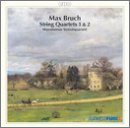| All Artists: Max Bruch, Mannheim String Quartet Title: Bruch: 2 String Quartets Members Wishing: 0 Total Copies: 0 Label: Cpo Records Release Date: 6/2/1998 Genre: Classical Styles: Chamber Music, Symphonies Number of Discs: 1 SwapaCD Credits: 1 UPCs: 761203946020, 076120394602 |
Search - Max Bruch, Mannheim String Quartet :: Bruch: 2 String Quartets
CD Details |
CD ReviewsTOP OF THE CLASS DAVID BRYSON | Glossop Derbyshire England | 01/29/2009 (5 out of 5 stars) "At the end of his thoughtful and enlightening liner note, Rick la Salle suggests that Bruch might be due a revival. He is mainly known for one solitary work, the first violin concerto, and I suppose Kol Nidrei and the Scottish Fantasia are fairly famous as well. In recent years I have got interested in him, and my collection now includes all the works for violin with orchestra, the double concerto for viola and clarinet, the chamber works with clarinet, the three symphonies and a few oddments. The quality of all these is so high and so consistent, and their individual idiom is so marked, that I too am left wondering how a composer who seems to me to be easily the equal of, say, Franck (to name just a contemporary) can have been treated by fashion in the way Bruch has been. I can only reflect that for many years the same fate befell no less than Handel, who in my estimation is greater than Bruch, Franck, Mendelssohn and Schumann added up. The two quartets are very early works, showing talent almost worthy of Mendelssohn at a similar age. The first was written at age 18 when the composer was still a student, the other 4 years later when he was seeking his fortune. I don't detect in them a particular melodic idiom that characterises Bruch's later work and that I find uncommonly attractive, a tone that is not always precisely melancholy (although it is often that) but has a haunting quality about it. Otherwise the melodic line has real strength, and the structure of the pieces shows real fluency. Bruch was a natural for the `sonata form', which is more than I could say for dear Schumann. This is not some prison-cage or straitjacket, whatever some writers may suggest. Haydn's great formal invention was both flexible and supportive to the imagination, not a book of rules, and that is why it was so dominant for so long. In Bruch's time Shaw was already saying, at the height of his Wagnerism, that the sonata form was as dead as Beethoven, but Shaw was getting ahead of himself. Franck was already modifying the idea fairly fundamentally, and soon Scriabin and Sibelius would abandon it in their sonatas and symphonies. By now it seems indeed to be culturally obsolete, but the techniques of fugue and passacaglia, both far older, have never gone out of style, and I would not bet that the sonata form may not be back. Meantime Bruch was the contemporary of not just Franck but also of Brahms and Dvorak, and they all knew what to do with this mode of composition. I am sure that Donald Francis Tovey himself, the very High Priest of Beethoven, would have found everything to his liking in these quartets. In one minor but interesting respect I find myself not quite in agreement with la Salle. In each quartet here the scherzo ends by recalling the melody of its trio. This resembles in no way what Beethoven does in his 7th symphony in my opinion. That process consists of bringing the scherzo material round 3 times, the trio twice in full and threatening a third appearance when B chops it off abruptly. The nearest thing to B's process is to be found where you might not be looking for it, but exactly where Tovey says you will find it, in the second and third scherzos of Chopin. Otherwise la Salle's note is a distinguished one. The recording, from 1996 and 1997, seems very good to me as well. The total playing time comes to only 56 minutes, but I prefer it that way rather than have some standard but incongruous filler like Barber's Adagio (or even Beethoven's Grosse Fuge), much though I might welcome those in a more suitable context. The performances strike me as absolutely first class. Just as Bruch was a natural for this kind of composition, so the Mannheim Quartet seem perfectly in tune with its interpretation and expression. I have not been in search of comparative versions, because fine as they are these quartets are not the only music in the world. I am glad to have got to know them belatedly, but I think I can tell a good thing when I hear one, and my conscience is clear about giving this disc an unqualified recommendation." Only 2 written, but Very Excellent.......... CJV | Illinois | 12/23/2008 (5 out of 5 stars) "Although these are early compositions by Bruch, they should not be disregarded. After purchasing his v.concertos & syms. I was very much impressed with Bruch. These are two wonderful SQs. They seem to be a bit Mendelssohnish, but with an improved stature. Bruch's ability to write catchy fast movements and heartfelt slow movements makes him one of the better romantic period SQ composers. The only drawback is his lack of productivity. I wish he would have wrote 20 or 30 more."
|

